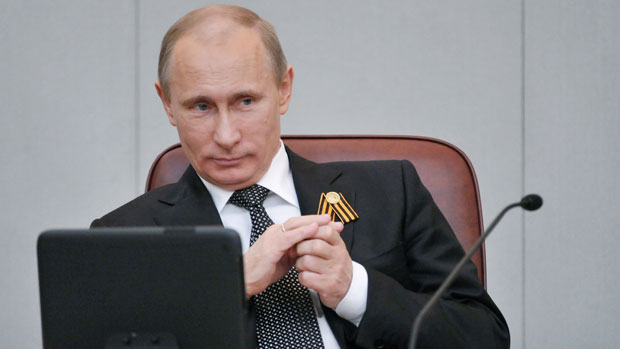Vladimir Putin: I may be in power until 2024
But Putin says he does not wish to be president for life, which would be 'harmful' to Russia

A free daily email with the biggest news stories of the day – and the best features from TheWeek.com
You are now subscribed
Your newsletter sign-up was successful
In an unusually candid interview, Vladimir Putin has hinted that he will run for president again in a move that would almost certainly keep him in power in Russia until 2024.
The pronouncement confirmed what many Russians suspected as long ago as 2012, when a poll found that a third of the country thought Putin would stand for another six year term as president in 2018.
However, in the interview broadcast on the state-run Tass news agency, Putin said that he does not wish to be president for life, which he said would be "harmful" and "not good for the country".
The Week
Escape your echo chamber. Get the facts behind the news, plus analysis from multiple perspectives.

Sign up for The Week's Free Newsletters
From our morning news briefing to a weekly Good News Newsletter, get the best of The Week delivered directly to your inbox.
From our morning news briefing to a weekly Good News Newsletter, get the best of The Week delivered directly to your inbox.
He said that his decision on whether to seek re-election would depend on "my inner feelings, my mood", AFP reports.
Putin has effectively been in power in Russia since 1999, when his predecessor Boris Yeltsin stepped down and made him first prime minister and then acting president. He was elected to the presidency for the first time in 2000 and then again in 2004, but then stepped aside after the two terms to comply with constitutional limits. For the next four years he maintained his influence by serving as prime minister with his loyal ally Dmitry Medvedev acting as president. In 2012 Putin was elected president again for a further six-year term.
In the Tass interview, the Russian leader said he understood that not all Russians supported him, but said that he was happy for his critics to express their opposition as long as they did so within the bounds of the law. But he said that he would not tolerate anyone who attempted to weaken the state, describing such people as "bacteria".
"They sit inside you, these bacilli, these bacteria, they are there all of the time," he said. "But when an organism is strong, you can always keep back the flu because of your immune system."
A free daily email with the biggest news stories of the day – and the best features from TheWeek.com
-
 The Olympic timekeepers keeping the Games on track
The Olympic timekeepers keeping the Games on trackUnder the Radar Swiss watchmaking giant Omega has been at the finish line of every Olympic Games for nearly 100 years
-
 Will increasing tensions with Iran boil over into war?
Will increasing tensions with Iran boil over into war?Today’s Big Question President Donald Trump has recently been threatening the country
-
 Corruption: The spy sheikh and the president
Corruption: The spy sheikh and the presidentFeature Trump is at the center of another scandal
-
 Putin’s shadow war
Putin’s shadow warFeature The Kremlin is waging a campaign of sabotage and subversion against Ukraine’s allies in the West
-
 Alexei Navalny and Russia’s history of poisonings
Alexei Navalny and Russia’s history of poisoningsThe Explainer ‘Precise’ and ‘deniable’, the Kremlin’s use of poison to silence critics has become a ’geopolitical signature flourish’
-
 What happens now that the US-Russia nuclear treaty is expiring?
What happens now that the US-Russia nuclear treaty is expiring?TODAY’S BIG QUESTION Weapons experts worry that the end of the New START treaty marks the beginning of a 21st-century atomic arms race
-
 Epstein files topple law CEO, roil UK government
Epstein files topple law CEO, roil UK governmentSpeed Read Peter Mandelson, Britain’s former ambassador to the US, is caught up in the scandal
-
 Iran and US prepare to meet after skirmishes
Iran and US prepare to meet after skirmishesSpeed Read The incident comes amid heightened tensions in the Middle East
-
 Israel retrieves final hostage’s body from Gaza
Israel retrieves final hostage’s body from GazaSpeed Read The 24-year-old police officer was killed during the initial Hamas attack
-
 China’s Xi targets top general in growing purge
China’s Xi targets top general in growing purgeSpeed Read Zhang Youxia is being investigated over ‘grave violations’ of the law
-
 Ukraine, US and Russia: do rare trilateral talks mean peace is possible?
Ukraine, US and Russia: do rare trilateral talks mean peace is possible?Rush to meet signals potential agreement but scepticism of Russian motives remain